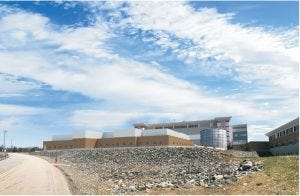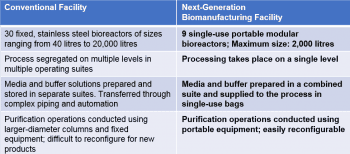
Amgen has broken ground on a single-use and modular biomanufacturing facility at a site in Rhode Island.
The groundbreaking ceremony at the West Greenwich site took place today in the presence of the governor of Rhode Island, Gina Raimondo and congressman Jim Langevin. Construction of the plant will begin in September.

An artist rendering of the Rhode Island plant. Image c/o Amgen
The facility, first announced in April, will make biologics for the US and global market once operational. It has been described as a “next-generation biomanufacturing plant,” meaning it is based on enabling technologies including single-use, modular design, and process intensification, and – according to the firm – will be constructed in half the time at approximately quarter the capital cost of a traditional plant.
The plant replicates Amgen’s US$200 million (€171 million) biologics production facility in Singapore, which opened its doors in 2014.

Conventional vs Next-Generation Facility
The $160 million investment is expected to create upwards of 150 new jobs and is supported by Rhode Island state economic development programs, including a tax credit program which could be worth as much as $4.45 million for Amgen.
“Rhode Island competed to be the location for the company’s ‘next-generation’ biomanufacturing facility and we were successful because of our skilled talent, ideal location, and potent incentives,” Rhode Island commerce secretary Stefan Pryor said in April.
Tax Reform
The plant has been decribed as the first-of-its-kind in the US for Amgen.
Like other US drugmakers, Amgen has looked to invest in the domestic market for recent investment, buoyed by the signing of the ‘Tax Cuts and Jobs Act’ last December. The Act the US reduced the US corporate tax rate from 35% to 21%, and helped US firms repatriate cash held overseas.
Amgen CEO Bob Bradway said the timing of the tax reform Act was “particularly relevant for us right now as we are on the cusp of deploying our so-called next-generation biomanufacturing technologies,” during his firm’s Q4 2017 financials in February.
“We developed these technologies in the US and thanks to tax reform, we will now build new manufacturing capacity and add highly skilled jobs here in the US to capitalize on them.”
About the Author
You May Also Like

schedl_b_and_w.jpg?width=100&auto=webp&quality=80&disable=upscale)
schedl_b_and_w.jpg?width=400&auto=webp&quality=80&disable=upscale)



